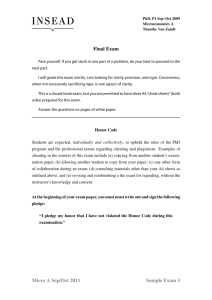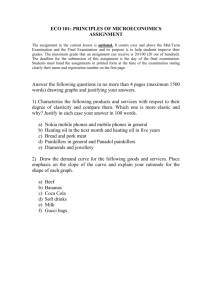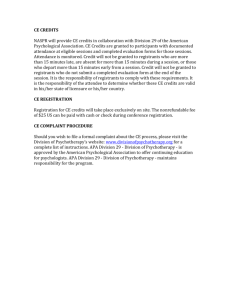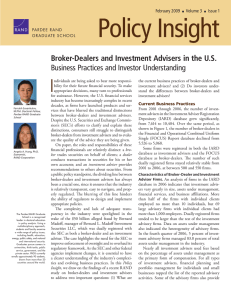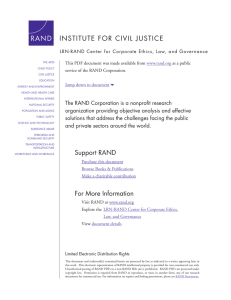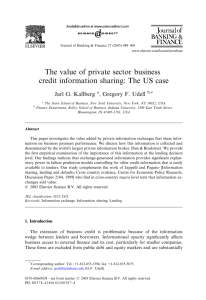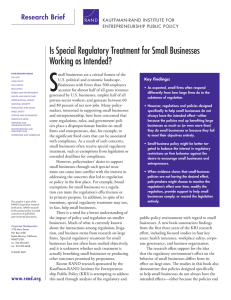Short Interest: A Summary of SEC Examination Priorities for 2013
advertisement
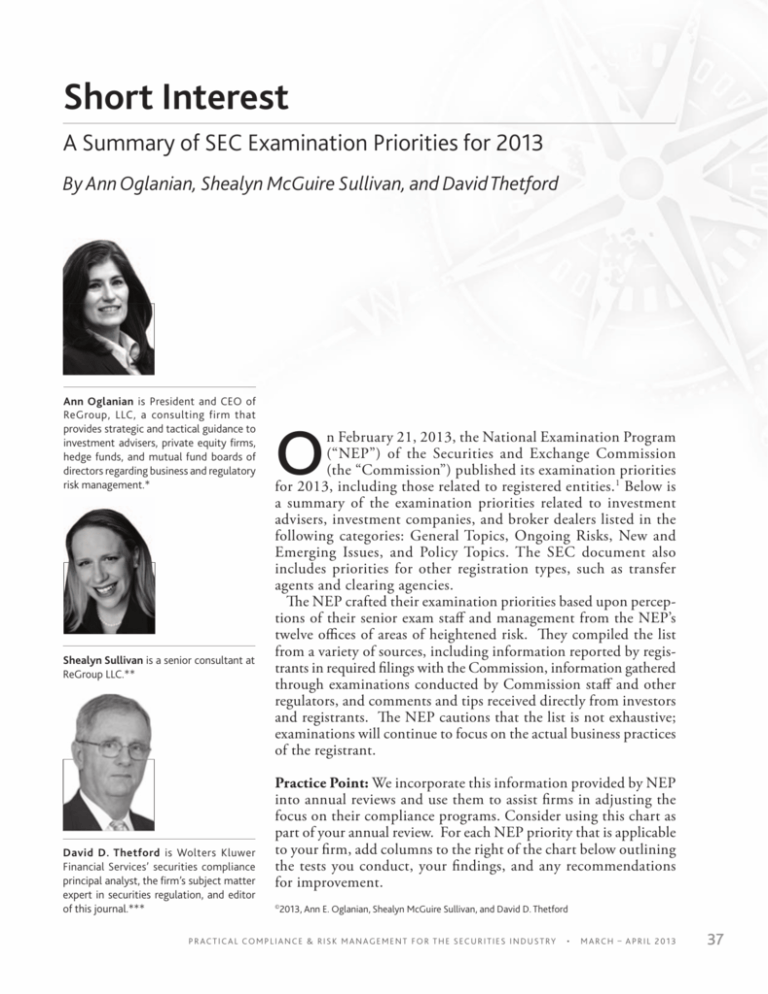
Short Interest A Summary of SEC Examination Priorities for 2013 By Ann Oglanian, Shealyn McGuire Sullivan, and David Thetford Ann Oglanian is President and CEO of ReGroup, LLC, a consulting firm that provides strategic and tactical guidance to investment advisers, private equity firms, hedge funds, and mutual fund boards of directors regarding business and regulatory risk management.* Shealyn Sullivan is a senior consultant at ReGroup LLC.** David D. Thetford is Wolters Kluwer Financial Services’ securities compliance principal analyst, the firm’s subject matter expert in securities regulation, and editor of this journal.*** O n February 21, 2013, the National Examination Program (“NEP”) of the Securities and Exchange Commission (the “Commission”) published its examination priorities for 2013, including those related to registered entities.1 Below is a summary of the examination priorities related to investment advisers, investment companies, and broker dealers listed in the following categories: General Topics, Ongoing Risks, New and Emerging Issues, and Policy Topics. The SEC document also includes priorities for other registration types, such as transfer agents and clearing agencies. The NEP crafted their examination priorities based upon perceptions of their senior exam staff and management from the NEP’s twelve offices of areas of heightened risk. They compiled the list from a variety of sources, including information reported by registrants in required filings with the Commission, information gathered through examinations conducted by Commission staff and other regulators, and comments and tips received directly from investors and registrants. The NEP cautions that the list is not exhaustive; examinations will continue to focus on the actual business practices of the registrant. Practice Point: We incorporate this information provided by NEP into annual reviews and use them to assist firms in adjusting the focus on their compliance programs. Consider using this chart as part of your annual review. For each NEP priority that is applicable to your firm, add columns to the right of the chart below outlining the tests you conduct, your findings, and any recommendations for improvement. © 2013, Ann E. Oglanian, Shealyn McGuire Sullivan, and David D. Thetford P R A C T I C A L C O M P L I A N C E & R I S K M A N A G E M E N T F O R T H E S E C U R I T I E S I N D U S T RY • MARCH – APRIL 2013 37 Short Interest: A Summary of SEC Examination Priorities for 2013 Investment Adviser–Investment Company General Topics These topics are areas of risk and examination priorities that the NEP believes apply to nearly all registrants, including investment advisers, investment companies, and broker-dealers. Fraud Detection and Prevention Build upon existing quantitative and qualitative analytical tools that identify business practices where there is greater opportunity for fraudulent conduct. Encourage and solicit tips, complaints and referrals. Corporate Governance and Enterprise Risk Management Meet with senior management and boards of entities and their affiliates to discuss enterprise risk, including how firms govern and manage financial, legal, compliance, operational, and reputational risks. Assess the firm’s approach to Enterprise Risk Management. Evaluate the firm’s tone at the top. Initiate a dialogue on key risks and regulatory requirements. Engage in “discovery” reviews to inform both examination policy and rulemaking efforts and joint monitoring efforts with other regulators. Conduct in-depth reviews of the manner in which registrants demonstrate and test the readiness of their business continuity plans. Conflicts of Interest Examine the efforts of large/complex firms to document periodic evaluations of conflicts of interest as part of their risk-assessment process, steps taken to mitigate the conflicts, the sufficiency of disclosures made to investors, and how such conflicts are being addressed. Examine the overall risk governance framework registrants use to manage conflicts. Technology Analyze the manner in which registrants leverage, supervise, and control technology, specifically including: Operational capability, Market access, Informational security, System outages, and Compromises to data integrity. Enhance review of the registrant’s ability to demonstrate a clear understanding and mitigation of operational information technology risk. Assess the governance and supervision of technology systems. Ongoing Risks 38 “Ongoing risks” are those that the NEP believes pose inherent risk or threaten continued reoccurrence. Safety of Assets Utilize a risk-based asset verification process to confirm the safety of client assets and compliance with custody requirements. Review: The adequacy of audits of private funds, Measures taken to protect client assets from loss or theft, and The effectiveness of policies and procedures. Focus on the extent to which new registrants: Recognize situations in which they have custody, Comply with Rule 206(4)-2 of the Advisers Act of 1940 (the “Custody Rule”), and its “surprise exam” requirement, Satisfy the Custody Rule’s “qualified custodian” provision, and Follow the exception to the independent verification requirement for pooled investment vehicles. Conflicts of Interest Related to Compensation Arrangements Review financial records to identify undisclosed (or poorly disclosed) compensation arrangements including: Undisclosed fee or solicitation arrangements, Referral arrangements (particularly to affiliated entities), and Receipt of payment for services allegedly provided to third parties. Marketing/Performance Focus on aberrational performance of registrants and funds. Focus on the accuracy of advertised performance including: Hypothetical and back-tested performance, Assumptions or methodology used, and Related disclosures and compliance with record keeping requirements. Review changes in advertising practices related to the JOBS Act. MARCH – APRIL 2013 • P R A C T I C A L C O M P L I A N C E & R I S K M A N A G E M E N T F O R T H E S E C U R I T I E S I N D U S T RY Short Interest: A Summary of SEC Examination Priorities for 2013 Conflicts of Interest Related to Allocation of Investment Opportunities Confirm that controls are in place to monitor the side-by-side management of performance-based fee accounts, such as certain private investment vehicles, and registered investment companies, or other non-incentive fee-based accounts, with similar investment objectives, especially if the same portfolio manager is responsible for making investment decisions for both kinds of client accounts or funds. Fund Governance Confirm that the registrant is making full and accurate disclosures to fund boards. Confirm that fund directors are conducting reasonable reviews of such information in connection with contract approvals, oversight of service providers, valuation of fund assets, and assessment of expenses or viability. New and Emerging Issues “New and emerging” risks are those that the NEP believes require increased scrutiny due to new circumstances, financial environments, new products and/or strategies, technological advances, regulations, mergers, and general business practice changes. New Registrants Launch a coordinated national examination initiative designed to establish a meaningful presence with these newly registered advisers, expected to run for two years and consisting of four phases: Engage with the new registrants, Examine a substantial percentage of the new registrants, Analyze examination findings, and Report observations to the industry. Prioritize examinations of private fund advisers where higher risks to investors may be indicated. Dually Registered IA/BD Expand joint examinations with the Broker-Dealer Program of dually registered firms and distinct broker-dealer and investment advisory businesses that share common financial professionals. Review how financial professionals and firms satisfy their suitability obligations when determining whether to recommend brokerage or advisory accounts, the financial incentives for making such recommendations, and whether all conflicts of interest are fully and accurately disclosed. Review dually registered firms’ policies and procedures to understand if such policies and procedures provide guidelines for when a financial professional makes a securities recommendation to a customer with a broker-dealer account versus an investment adviser account. “Alternative” Investment Companies Focus on the growing use of alternative and hedge fund investment strategies in open-end funds, exchange-traded funds, and variable annuity structures. Assess whether: (i) leverage, liquidity, and valuation policies and practices comply with regulations; (ii) boards, compliance personnel, and back-offices are staffed, funded, and empowered to handle the new strategies; and (iii) the funds are being marketed to investors in compliance with regulations. Payments for Distribution in Guise Focus on the wide variety of payments made by advisers and funds to distributors and intermediaries, the adequacy of disclosure made to fund boards about these payments, and boards’ oversight of the same. Assess whether such payments are made in compliance with regulations, including Investment Company Act Rule 12b-1. Policy Topics As part of the Commission’s ongoing efforts to gain a deeper understanding and knowledge of specific practices or how previously adopted rules are being implemented by registrants, the 2013 NEP also includes what the Commission refers to as “Policy Topics”. Money Market Funds Review whether firms are conducting stress testing of money market funds as required Rule 2a-7 of the Investment Company Act, what factors they are considering in the stress testing, and the results of the stress testing. Compliance with Exemptive Orders Focus on compliance with previously granted exemptive orders such as: Those related to closed-end funds and managed distribution plans, employee securities companies, exchange-traded funds, and the use of custom baskets; and Those granted to fund advisers and their affiliates permitting them to engage in coinvestment opportunities with the funds. Compliance with the Pay to Play Rule Review compliance with the recently adopted Pay to Play rule, as well as assess the practical application of the rule. P R A C T I C A L C O M P L I A N C E & R I S K M A N A G E M E N T F O R T H E S E C U R I T I E S I N D U S T RY • MARCH – APRIL 2013 39 Short Interest: A Summary of SEC Examination Priorities for 2013 Broker-Dealer General Topics See the General Topics in Investment Adviser-Investment Company, above Ongoing Risks “Ongoing risks” are those that the NEP believes pose inherent risk or threaten continued reoccurrence. Sales Practices/Fraud Affinity fraud or fraud targeting seniors. Unsuitable recommendations of higher yield products (e.g., unsuitable recommendations of municipal or corporate bonds), as well as improper supervision and due diligence processes regarding those recommendations or those products. Activities and products on the periphery of certain registered entities, such as outside business activities or an affiliated entity that the registrant claims is beyond the Commission’s jurisdiction. Conflicts of interest that are not appropriately mitigated, and are not clearly disclosed in an understandable and timely manner. Certain firms identified as recidivist or high-risk for potential misconduct. Trading High frequency trading, Algorithmic trading, Proper controls around the use of technology, Alternative trading systems, and Order routing practices Capital Staff will review clearing firms with multiple correspondents engaging in high frequency/high volume trading, focusing on: The clearing firms’ internal controls for managing intraday liquidity risk, as well as Assessing intraday net capital, and Other financial risks. AML Identify clearing and introducing firms that appear to have weak anti-money laundering (“AML”) programs. Focus on the firm’s risk assessment of its business practices and implementation of the AML program related to those risks, including risks associated with taking on the accounts of failed or expelled firms. New and Emerging Issues “New and emerging” risks are those that the NEP believes require increased scrutiny due to new circumstances, financial environments, new products and/or strategies, technological advances, regulations, mergers, and general business practice changes. Exchange Act Rule 15c3-5 (The Market Access Rule) Focus on firms’ compliance with this rule, with particular attention to master/sub-accounts relations and proper controls relating to proprietary trading. Particular areas of focus are below: Master / Sub-Accounts Potential issues related to money laundering activity, market manipulation, unregistered brokerdealers, excessive margin, and inadequate minimum equity for pattern day traders; Also, adequacy of books and records maintained by broker-dealers that provide market access. Proprietary Trading Compliance with requirements around capital thresholds on proprietary trading, including error accounts; Compliance with requirements that these thresholds also encompass a methodology for accounting for open quotes, taking into account quotes associated with market making activities. Supervision of Registrants’ Technology System Controls and Governance Effectiveness of broker-dealers’ controls and oversight over technology systems and supervision of personnel, Adequacy of firms’ protocols to address systems that are acting counter to expectations, and Robustness of firms’ risk management procedure. Dual Registrants / Regulatory Coordination The B-D Program will maintain its focus in this area in coordination with the CFTC, and More broadly, the B-D Program is emphasizing stronger coordination among Designated Examination Authorities. Exchange-Traded Funds 40 MARCH – APRIL 2013 • Suitability of recommendations of leveraged or inverse ETFs to retail investors. P R A C T I C A L C O M P L I A N C E & R I S K M A N A G E M E N T F O R T H E S E C U R I T I E S I N D U S T RY Short Interest: A Summary of SEC Examination Priorities for 2013 Policy Topics As part of the Commission’s ongoing efforts to gain a deeper understanding and knowledge of specific practices or how previously adopted rules are being implemented by registrants, the 2013 NEP also includes what the Commission refers to as “Policy Topics”. JOBS Act Conduct reviews of entities participating in the crowd funding business. Other Regulatory Requirements Pending adoption of final rules, focus compliance with the new registration and related rules applicable to municipal advisors as well as incentive compensation. Conduct examinations for compliance with Security-Based Swap Dealers rules pending the final adoption or compliance effective date for such rules. ENDNOTES * Ann Oglanian has over 20 years of professional experience in the financial services industry. Formerly, she was the Managing Director, General Counsel and Chief Compliance Officer for Montgomery Asset Management. Prior thereto, she was a partner in the investment services practice group of the Chicago-based law firm, Vedder Price, where she represented a wide range of mutual funds, investment advisers, independent fund directors and broker/dealers. Formerly, Ann served as in-house counsel to Strong Capital Management and Kemper Financial Services. Ann is a member of the Editorial Advisory Board of Practical Compliance & Risk Management. Ann is a regular contributor to various investment industry periodicals and a frequent speaker on a wide variety of topics relating to leadership, enterprise risk management, compliance, and ethics. ** Shealyn Sullivan provides expert guidance to investment advisers on developing strategic and tactically effective compliance programs, conducts compliance reviews, drafts regulatory documents, and advises compliance officers and management teams with respect to issues pertaining to developing and maintaining compliance programs. She has more than 19 years of financial services industry experience both as a management consultant and a compliance consultant. Having worked with private/trust banking firms, insurance/retirement firms, mutual fund companies, registered investment advisers, and hedge fund firms, her focus has been on compliance, operations, marketing, and product development. Shealyn earned her BA from the University of Notre Dame in South Bend, Indiana and her JD from Suffolk University Law School in Boston Massachusetts. ***David Thetford began his career in compliance as a compliance examiner for NASD. He served as a branch compliance manager for Morgan Stanley, a regional supervisor of examiners for Wachovia Securities, and as Chief Compliance Officer for a small broker dealer specializing in private equity. David is a retired U.S. Navy Commander. 1 http://www.sec.gov/about/offices/ocie/national-examination-program-priorities-2013.pdf This article is reprinted with permission from Practical Compliance and Risk Management for the Securities Industry, a professional journal published by Wolters Kluwer Financial Services, Inc. This article may not be further re-published without permission from Wolters Kluwer Financial Services, Inc. For more information on this journal or to order a subscription to Practical Compliance and Risk Management for the Securities Industry, go to onlinestore.cch.com and search keywords “practical compliance” P R A C T I C A L C O M P L I A N C E & R I S K M A N A G E M E N T F O R T H E S E C U R I T I E S I N D U S T RY • MARCH – APRIL 2013 41



